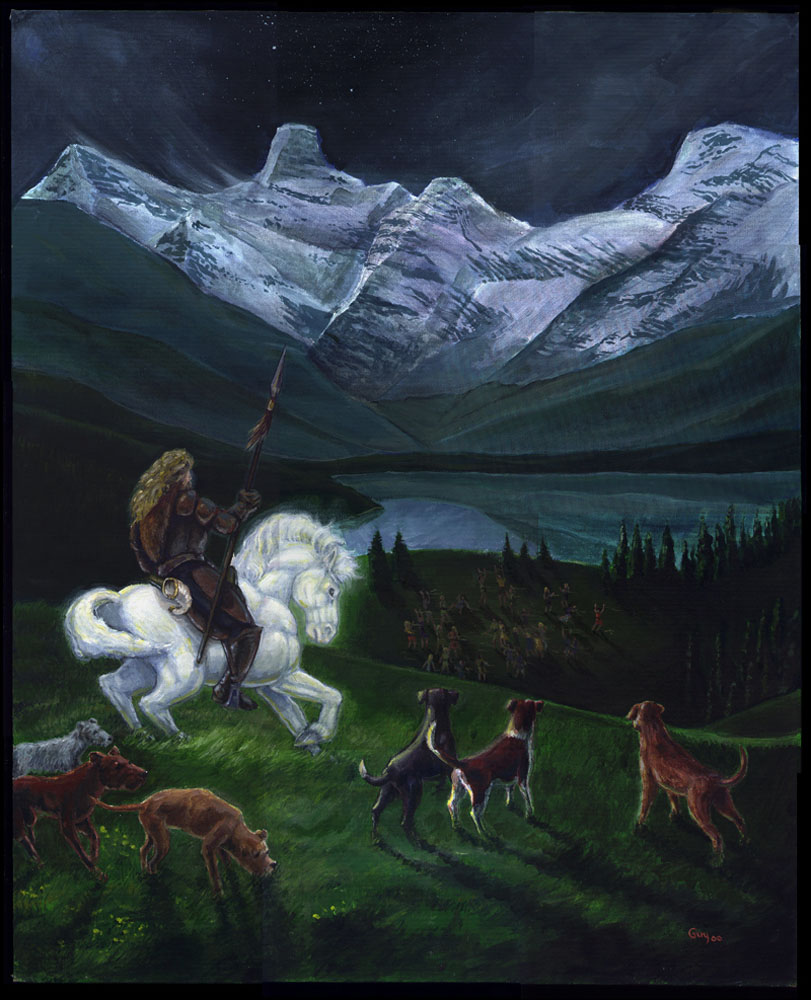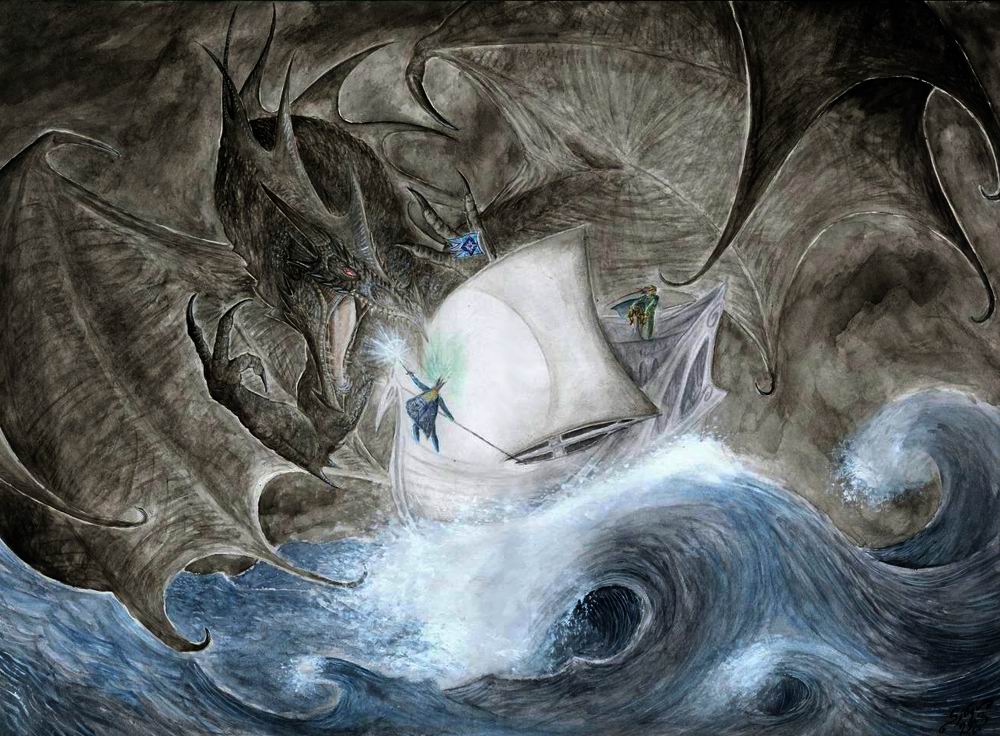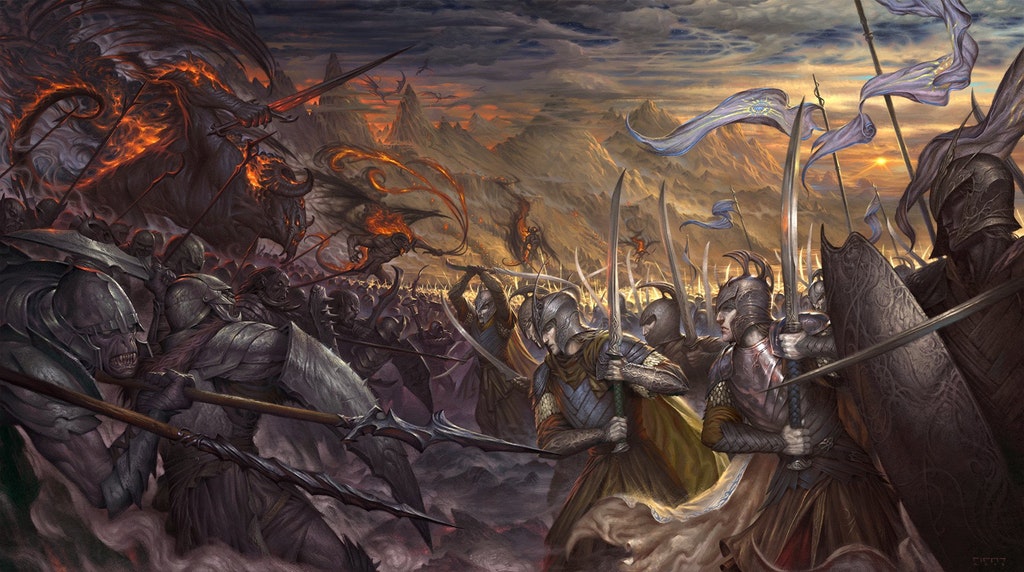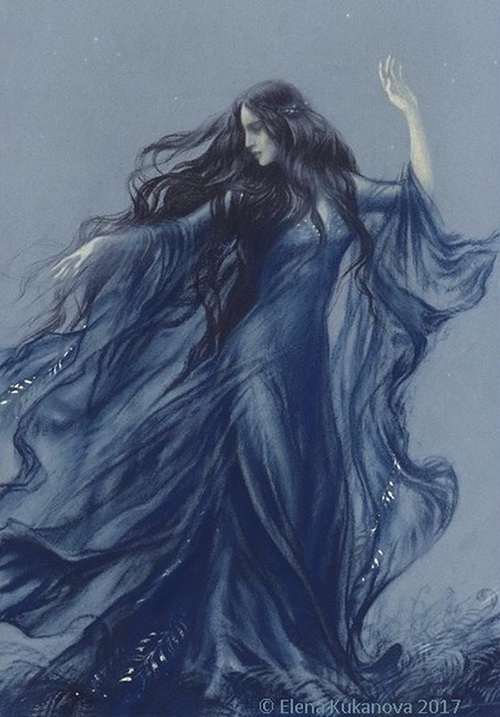Fionn eä Vanwi
High King Fionn of Clan Nelá (a.k.a. The Harp Chief)
"His sword was long, his lance was keen,
his shining helm afar was seen;
the countless stars of heaven's field
were mirrored in his silver shield."
There is one High King of all the Elves, and his name is Fionn eä Vanwi. Fionn means 'golden-haired'. And 'eä Vanwi' is a precious name, because it means 'the first of the un-fallen Elves'. It was Fionn who kept his clan from mustering against the gods in unrighteous rebellion. It was Fionn who rejected the help of Gendûet, when that god, still in fair form, came to his door and promised happiness and knowledge if only Fionn and his clan would help unmask the masked gods. For his wisdom, Fionn's people could remain in the divine light, soft and cool — though they did, in sorrow, watch their kin march to the ends of the Earth, Doomed never to know peace till the End of Days.
Subject of Poems and Stories
Many claim that the gods walk yet among us, unseen and invisible. They are felt only with a passing tremor of the heart; a rising hope, or a moment of courage and honesty otherwise impossible. And if the gods still walk in the world, then this High King, perhaps, does too. Fionn eä Vanwi is subject of many stories and poems. Some of them are paradisal, set during the times of gentle Boryen. Others are mythical, set during the Morning of Man and the beginning of the Wars of Hate, espousing the strange but wonderful deeds of Fionn. The tales are spread across many cultures. The Elves have the greatest store of them.
One of the more famous of Fionn's adventures is his Defense Against the Unfaithful, in which he gathers the various Elven-folk who desire loyalty to the gods, and invites them into his clan's protection. Fionn, leading his House, deals with increasingly dangerous encounters between him and the other, more unhappy, Elves. The tale culminates in a great riot, where Fionn finds his effigy being burned in a courtyard, and he settles the gathering with a joke at his expense. Another popular tale is his part in the creation of the Merfolk.
But there is no comparison to the most famed of Fionn eä Vanwi's exploits. That bloody story, terrible as a thunderbolt, striking into all a palpitating fear and awe of the Heavenly Host. It is the story of the High King of the Elves leading the Armies of the Gods, as they made their dreadful way across the world, marching towards the Iron Fortress of Gendûet, an army with banners unstoppable, steam and fire in their wake.
The Seeds of the War of Hate
When the gods still walked in tangible form upon the earth, they wore great masks that hid their faces. This was a mercy, and though the gods explained with great care and tenderness as to why they should hide themselves in part, Gendûet, who had become lonesome and proud (though he still hid these traits), saw an opportunity for strife and ambition. So the Seat of Judgement whispered among the Elves that the gods meant to hide the ultimate joys. He spoke with great skill, and those who listened thought that Gendûet's words were their own. At last, the Elves amassed in disgust of the gods, and the gods could not see the source of the strife. Gendûet had clouded the gods' sight, but the Elves had fanned their disgust by themselves.

The story is complex and many-layered. The full deceptions of Gendûet are not listed here, and the gods, still unused to the nature of the Elves, acted, perhaps, too gently against them. Many famed Elves also walked during those days, and their powers were daily growing. The gods brought together the Elven people and their leaders, and they counseled together. Gendûet sat in silence, that day.
Breaking the Godly Thread
But the Elves had brought with them weapons of war, smithied in secret. Wearing helms with great plumes, wielding silvery swords and flashing banners with mighty crests, the Elves did not want to sit idly. Hundimar spoke carefully, and, for a time, there seemed a chance of peace. But the rot of Gendûet's words had taken too deep a root, and a lone arrow signaled the Breaking of the Elves. A battle erupted, and the gods, disheartened and weighed with sorrow, took themselves and fled the council chambers.
They were harried by the amassed army but at last, came upon the shore and the ever expansive sea. The Elves amassed upon the waters and watched their gods sailing away in white ships. They fired many arrows at the ships, but none could harm the Seats. It was a stone, fired from a sling, that dealt the most damage. It struck the mask of Chesed Seat of Love, wife to Gendûet, and slight crack, imperceptible to the eye, was formed. At that, a light as scorching as the sun, more brilliant than the fiercest flame, burst outwards and smote a tenth of the assembled host of the Elves. These elves fell down in agony, and they are forever named the Itie'lman: the Blind Elves. The gods disappeared over the horizon, and the light shone no more.
For this deed Gendûet has forever despised the Elves, though he has used them most to his nefarious purposes.
Breaking of the Elves
"Tears unnumbered ye shall shed... so that not even the echo of your lamentation shall pass over the mountains."
By that light, the Itie'lman saw the error of their ways, though they were still sundered from the gods. They departed in understanding and union to each other. Their various peoples went to establish their kingdoms for their own peoples. The Yeqitari, the chief instigators of Gendûet's will, did not understand the sudden melancholy now come upon their kin, and also set out towards the edges of the earth to establish vast empires.
The Morgondi were not present at the council with the gods. This was not out of love for the gods, but out of forgetfulness and lack of care. The Morgondi are counted among the Traitors.
The Ava'lman, the Lost Elves, or, the Elves who never received or answered the summons to Boryen, are not Traitors, but they are still sundered from the Divine.
As for the Elves led by Fionn, they made for themselves ships of pale wood and golden sails, and they set off for the gods soon after their departure. When these Elves had at last arrived at the shores of Heaven, Vahan changed the earth forever after, so that the Straight Path can be taken no longer, and the world was set round, so that no longer could you sail and reach the Blessed Place; and no longer could you see its high mountains from a distance. Though for now the stars were still near, and Heaven was still truthfully also Sky. This was the first changing of the world.
The Elves led by Fionn called themselves the Vanwi, for though they were of many different clans they were in communion with each other and were the Lovers of the Good; they are also called the Un-fallen, also called the Fairies. Among the Vanwi are many clans and peoples. Most famous of these are the Shii, the Twilight Elves.
So were the seeds of Hate sown. And all sorrows of the Earth sprout from these times like thorns and brambles.
The End of the Wars of Hate

Fionn's most famed deeds occurred at the beginning and at the end. When the gods descended like lightning they landed first in Boryen. The fury of the fight against the dark armies of Gendûet broke the land forever. We know that on his tall war-horse Fionn rode at the forward. He appeared in all his ancient splendor. Tall and fell, beautiful and proud, stern and with fire in his eyes. Upon Fionn's brow was a crown of light, and in his hand was a spear that glittered like ice.
He wore armour of silver, and the sound of his voice carried clear and loud like the gales of the Bory Sea. He led the mighty Hosts of the Vanwi. Flanking him were shining Principalities, and they were clothed like the elements. About him flickered the Powers, and the Dark Enemies trembled at the sight.
With the blowing of the Horn of Arc, the Vanwi crashed against the Darkness, and the death-throes of the enemy rose to Heaven as a grim offering and prayer, and the hooves of the Vanwi horses beat the dust of the earth and trampled all who would forbear. So the battles went, filled with frenzy and fire, and the Hosts of the Vanwi went across Erub gathering the Freefolk. Under their banner rode the mighty Itie'lman, at last reunited with their sundered kin. There were also the clans of Men: the House of Forn, the House of Al-Afir, the House of Tuakin, and the Corodwalt tribes. They gathered the mighty armies of the Dwarrow, lead by the King of the Whole Underworld Pazlaghl, wearing his dreadful monster mask. And Fionn led a mighty cadre of Metallic Dragons, led by Guilwanden the Long-Suffering. But this cadre was small, for the Metallic Dragons had suffered unspeakable losses to the designs of Marqôd.
The Hosts of the Vanwi grew and marched onwards unstopped, though the gods had to leave momentarily to deal with the wolves Scorn and Hate, who chased and bayed the Sun and Moon, and threatened to swallow them bodily. But the Hosts halted as they came to the city of Ballag, its steel and glass towers glittering in the noonday sun, the city guarded by the Iron Gates of Omkrondur, and they laid siege to it. The end of the Wars of Hate was near.
Onslaught of the Chromatics
But it availed him not.
In his desperation Gendûet released his final resort. There the violent flurry of the winged Chromatic Dragons was unleashed, a Force that had never before been seen; and so sudden and so ruinous was the onset of that terrible fleet that the Host of the Vanwi was driven back many miles, for the coming of the Dragons was with great thunder, and lightning, and a tempest of fire. They were lead by the Most Ancient Patriarch Young Purple, and his son Kauotoc. A great pit was broke upon the earth by that storm, and it is called Kauotoc's Scar, today. It was only with immediate action and great cunning that Fionn saved many of his men who would have otherwise been slain.
Then the gods came, shining with white flame, and their fury was terrible. Detheril descended with them in his white ship with its fair sails.
There was battle in the air through all the day and through all the night of dark doubt. Pazlaghl, solitary in the field, faced Young Purple; around him were the scorched bodies of his house thanes. That day is of sorrow for the Dwarrow, for their King fell. But the things of Evil do not take pride in that day, either, for Young Purple was slain, and his corpse was torn to shreds by the Eagles. Kauotoc, in his retreat, was pierced by the blade of Kullervo, and with his death sighs he cursed the hero and his wife, who was called Eílean and was Kautoc's daughter, and Kullervo's tale ended in tragedy.
The stars fell from their place that day, and they struck the earth with a terrible noise. And they say that figures like Men, but brilliant as the Day, strove with the gods and killed and dirtied themselves in the rivers of blood. The moon shone awful and round. It beheld a fearsome light, and the Eastern Elves would hate it forever afterwards.
The End of the Elves
But before the rising of the Sun, Detheril slew Volveya, mightiest of dragons, and cast him from the sky; and he fell upon the towers of Ballag, and the city was destroyed entirely, and nothing grows there to this day. The Sun arose, and the Hosts of the Heavens were victorious, and well-nigh all the dragons were killed. Then the gods came to the Iron Fort of Gendûet, and they unroofed his pits. Gendûet fled, and he begged for peace and pardon. But they hewed his feet from under him, and he was hurled upon his face.
They tied the Traitor God in the chains of Hlinip. Then the Hosts of Heaven left across the sea on their many ships. The Elves of the West and East were granted welcome by Fionn eä Vanwi, who spoke for the gods, and he told them that they would wait in the Halls of Ciborium for their appointed judgment of deed and word.
Many accepted the offer, many did not. The gods gave to the Corodwalt the island of Nelqora for their brave actions. Thus ended the Age of the Elves, and so began the Age of Men.
Not all has been said of those times. But of the deeds of Fionn, his leadership in the Seventh War of Hate is the most glorious and chivalrous.
Where He Lays?
“Yet some men say in many parts of England that King Arthur is not dead, but had by the will of our Lord Jesu into another place; and men say that he shall come again, and he shall win the holy cross.”
It is a common belief that the High King of the Elves still wanders the world in disguise. He will help those in great need on occasion and guide if need be. But he will not return in full splendour until the End Times, when Gendûet will return and the need for military might is required. For now, it is pleasant to imagine the Harp Chief playing his eponymous instrument somewhere in a clear glade, the music uplifting some unaware person.
Êa síra elin sû e-govaned
We source our information from the Édain Sagas.



Comments